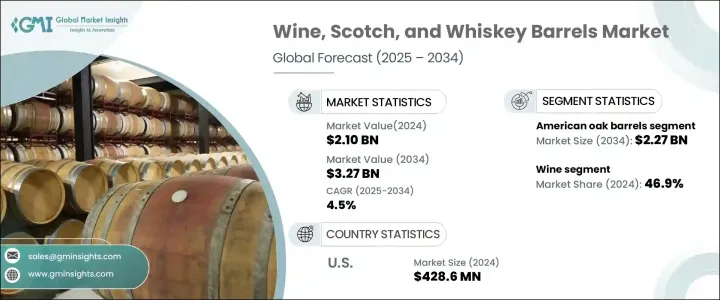
세계의 와인, 스카치 및 위스키 배럴 시장은 2024년 21억 달러에 달했고, 2025년부터 2034년까지 CAGR 4.5%로 안정적으로 확대할 전망입니다.
이 성장은 소비자가 정교한 맛을 약속하는 프리미엄으로 숙성된 제품을 선택하게 되어 숙성된 증류주, 특히 스카치 위스키 수요가 급증하고 있는 것이 주요 요인입니다. 공예 및 장인 음료 수요가 높아짐에 따라, 고품질 배럴에 대한 요구도 높아지고 있습니다. 이 배럴은 최종 제품에 독특한 풍미, 질감, 아로마를 부여하는 숙성 과정에서 중요한 역할을 합니다. 소량 생산과 장인 기술을 중시하는 크래프트 디스틸러리는 이 배럴 수요 급증의 최전선에 있어, 증류주의 개성을 높이기 위해서 새로운 배럴을 필요로 하는 경우가 많기 때문입니다.

배럴은 알코올 음료의 숙성에 필수적이며, 그 수요는 프리미엄으로 세련된 음료에 대한 소비자 선호 증가에 따라 최근 꾸준히 증가하고 있습니다. 와인, 스카치 및 위스키 등의 스피릿의 풍미를 풍부하게 하는 배럴의 역할은 아무리 강조해도 부족합니다. 이 배럴은 애호가가 선호하는 복잡하고 세련된 특징을 개발하는 역할을 담당합니다. 소비자가 보다 고품질의 숙성 음료를 요구하게 됨에 따라, 증류주 및 와인 제조업체는 그 대표적인 제품을 만들기 위해 최고급 배럴을 사용하게 되었습니다. 시장은 지속가능한 방식으로 조달된 고급 목재를 사용하는 방향으로 강력한 변화를 보여주며 최종 제품에 부가가치와 독자성을 더하고 있습니다.
| 시장 범위 | |
|---|---|
| 시작 연도 | 2024년 |
| 예측 연도 | 2025-2034년 |
| 시작 금액 | 21억 달러 |
| 예측 금액 | 32억 7,000만 달러 |
| CAGR | 4.5% |
시장은 배럴 유형별로 아메리칸 오크 배럴, 유럽 오크 배럴, 기타 오크 배럴이 리드하고 있습니다. 2024년에는 아메리칸 오크 배럴만으로 14억 9,000만 달러를 차지했고, 2034년에는 22억 7,000만 달러로 성장할 것으로 예측되고 있습니다. 이 성장은 와인, 스카치 위스키, 버번, 라이 위스키 등 다양한 음료의 숙성에 사용되는 아메리칸 오크의 다양성과 비용 효과 때문입니다. 또한 아메리칸 오크 배럴은 신뢰성이 높고 지속 가능한 생산이 가능하기 때문에 세계의 배럴 제조 업체들이 가장 선호하는 제품입니다.
용도별로 볼 때 시장은 와인, 스카치 위스키, 위스키 및 기타 카테고리로 나뉩니다. 특히 주목할 만한 것은 와인 분야로, 2024년에는 9억 8,640만 달러를 기여해, 시장의 47% 가까이를 차지했습니다. 오크 배럴은 와인의 풍미와 아로마 프로파일에 복잡성, 깊이, 풍부함을 더함으로써 와인 제조에 매우 중요한 역할을 합니다. 프리미엄의 숙성 와인 수요가 세계적으로 높아짐에 따라, 우수한 특성과 세련성을 갖춘 와인을 만들기 위한 최고 품질의 배럴에 대한 요구도 높아지고 있습니다.
미국에서는 와인, 스카치 및 위스키 배럴 시장이 2024년 4억 2,860만 달러를 창출했습니다. 이 나라에서는 공예 음료 생산 증가로 이 분야가 급성장하고 있습니다. 소규모 증류소, 양조장, 와이너리가 급증함에 따라 품질과 개성이 중시되고 숙성 과정에 필수적인 고품질 배럴 수요가 증가하고 있습니다. 이 동향은 앞으로도 계속될 것으로 예상되고 미국의 배럴 시장은 계속적인 확대가 전망되고 있습니다.
The Global Wine, Scotch, And Whiskey Barrels Market reached USD 2.1 billion in 2024, with expectations to expand at a steady CAGR of 4.5% from 2025 to 2034. This growth is largely driven by the surging demand for aged spirits, particularly scotch whisky, as consumers increasingly opt for premium, mature products that promise refined flavor profiles. As the demand for craft and artisanal beverages rises, so too does the need for high-quality barrels, with these vessels playing a crucial role in the aging process that imparts distinctive flavors, textures, and aromas to the final product. Craft distilleries, which emphasize small-batch production and artisanal craftsmanship, are at the forefront of this barrel demand surge, as they often require new barrels to enhance the character of their spirits.

Barrels are indispensable for the maturation of alcoholic beverages, and their demand has been steadily rising in recent years due to growing consumer preferences for premium and sophisticated drinks. The role of barrels in enriching the flavor profile of spirits such as wine, scotch, and whiskey cannot be overstated. These vessels are responsible for developing the complex and refined characteristics that connoisseurs appreciate. As consumers seek higher-quality, aged beverages, distillers and winemakers increasingly turn to top-tier barrels to craft their signature products. The market has seen a robust shift toward the use of premium, sustainably sourced wood, which adds both value and uniqueness to the final product.
| Market Scope | |
|---|---|
| Start Year | 2024 |
| Forecast Year | 2025-2034 |
| Start Value | $2.1 Billion |
| Forecast Value | $3.27 Billion |
| CAGR | 4.5% |
The market can be broken down into different barrel types, with American oak barrels, European oak barrels, and other oak barrels leading the way. In 2024, American oak barrels alone accounted for USD 1.49 billion and are projected to grow to USD 2.27 billion by 2034. This growth is attributed to the versatility and cost-effectiveness of American oak, which is used to age a wide variety of beverages, including wine, scotch whisky, bourbon, and rye whiskey. American oak barrels are also favored for their reliable and sustainable production, which makes them a go-to choice for barrel makers worldwide.
When looking at applications, the market is divided into wine, scotch whiskey, whiskey, and other categories. The wine segment is particularly noteworthy, contributing USD 986.4 million in 2024, representing nearly 47% of the market. Oak barrels play a pivotal role in winemaking by adding complexity, depth, and richness to the flavor and aroma profiles of wine. As global demand for premium, aged wines continues to rise, so does the need for top-quality barrels to create wines with superior characteristics and sophistication.
In the U.S., the market for wine, scotch, and whiskey barrels generated USD 428.6 million in 2024. The country is seeing rapid growth in this sector, driven by the rise in craft beverage production. As micro-distilleries, breweries, and wineries proliferate, the emphasis on quality and distinctiveness has increased, making the demand for high-quality barrels essential for the aging process. With this trend expected to continue, the U.S. market for barrels is poised for continued expansion.